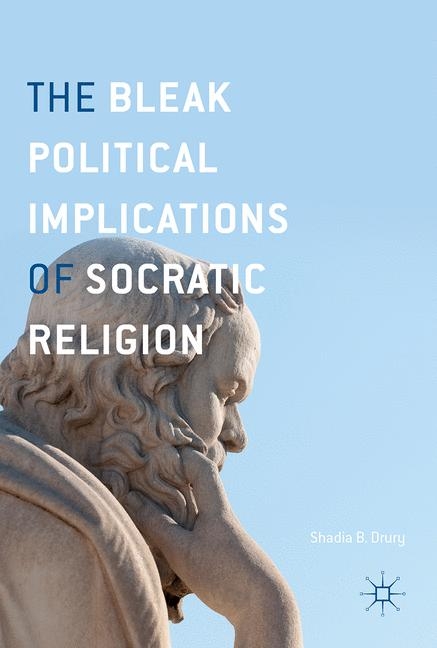
The Bleak Political Implications of Socratic Religion
Springer International Publishing (Verlag)
978-3-319-54441-0 (ISBN)
- Titel ist leider vergriffen;
keine Neuauflage - Artikel merken
The book makes the case for the prosecution, denouncing the religion of Socrates for inciting a radical politics of absolutism and monism that continues to plague Western civilization. It is time to recognize that Socrates was no liberator of the mind, but quite the contrary-he was the architect of a frightful authoritarianism, which continues to manifest itself, not only in Islamic terror, but also in liberal foreign policy. Defending Homer and the tragic poets, the book concludes that the West has imbibed from the wrong Greeks.
Shadia B. Drury is Fellow of the Royal Society of Canada at University of Regina, CN. She is author of Aquinas and Modernity (2008), Terror and Civilization (2004), Leo Strauss and the American Right (1997), Alexandre Kojève: The Roots of Postmodern Politics (1994), The Political Ideas of Leo Strauss (updated Edition, 2005), and is a regular contributor to Free Inquiry.
Preface
I. The Political Case Against Socrates 1. Alcibiades and the Defeat of Athens 2. Critias and the Thirty Tyrants 3. The Amnesty 4. Oligarchic Radicals 5. Socrates and Plato 6. Socrates and Critias 7. The Gadfly of Athens
II. The Religious Case Against Socrates 1. Greek Civil Religion 2. Mutilating the Hermae 3. Defeating Euthyphro 4. Inventing New Gods 5. Perverting Piety 6. Aristophanes: The Atheism of Socrates 7. The Orphism of Socrates
III. The Defense 1. Xenophon's Denial 2. Edict of the Thirty Tyrants 3. The Case of Leon of Salamis 4. The Case of the Generals at Arginusae 5. Unwillingness to Escape 6. Plato's Legend 7. Tropes in Plato's Defense of Socrates 8. Socrates and Jesus 9. Verdict of the Ages 10. Socrates and Heidegger
IV. How Plato Legitimizes the Case for the Prosecution 1. The Socratic Paradox 2. Resolving the Paradox I: Divine Inspiration 3. Resolving the Paradox II: Statesmanship 4. The Sunny Side of Plato's Politics 5. The Dark Side of Plato's Politics
V. Plato's Critique of Homer Repudiated 1. Religion without Lies 2. Religion without Asceticism 3. Religion without Dualism 4. Religion without Cosmic Justice 5. The Hubris of Emulating the Gods 6. Accepting Responsibility 7. The Manly Virtues 8. Savage Moralism Averted
VI. The Tragic Poets Defended 1. Tragedy as Innocent Suffering 2. Hegel: Was Socrates a Tragic Figure? 3. Sophocles: Why True Nobility is not Socratic 4. Nietzsche: Did Socrates Defeat Tragedy? 5. Tragedy, the Bible, and Crime Fiction
VII. Socratic Mischief 1. The Burden of Guilt 2. Authoritarianism Unhinged 3. Turning Hubris into Piety 4. Socrates, Enlightenment, and Imperialism 5. Postmodern Nihilism 6. Debunking the Socratic Legend
Annotated Bibliography
"This book is a provocative, polemical variation on the Nietzschean themes that Socratic philosophy was the will to power of an ugly man against a culture of beauty and that Christianity was Platonism for the masses. ... The book is a helpful reminder to contemporary scholarship that the ironic Plato also had a reformist side to elevate democracy's apolitical focus on bodily needs. Summing Up: Recommended. Upper-division undergraduates through faculty." (W. J. Coats, Choice, Vol. 55 (5), January, 2018)
| Erscheinungsdatum | 20.06.2017 |
|---|---|
| Zusatzinfo | XVII, 271 p. |
| Verlagsort | Cham |
| Sprache | englisch |
| Maße | 148 x 210 mm |
| Gewicht | 508 g |
| Themenwelt | Sozialwissenschaften ► Politik / Verwaltung ► Politische Theorie |
| Schlagworte | Ancient Philosophy • authoritarianism • Christianity • Civilization • Classical Philosophy • Democracy • Greeks • Homer • Modern philosophy: since c 1800 • Morality • Pagan • Plato • Pluralistic • plurality • Political Science & Theory • Political Science and International Studies • Political Science & Theory • Political structures: democracy • political theory • politics & government • politics and religion • Politics & government • Postmodern philosophy • Religion & Politics • Religion & politics • Strauss • terrorism • universalistic • universality • Xenophon |
| ISBN-10 | 3-319-54441-1 / 3319544411 |
| ISBN-13 | 978-3-319-54441-0 / 9783319544410 |
| Zustand | Neuware |
| Haben Sie eine Frage zum Produkt? |
aus dem Bereich


